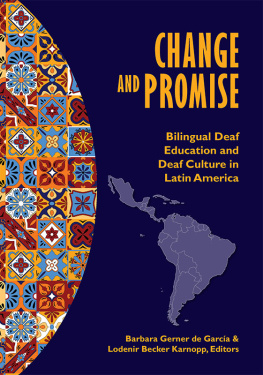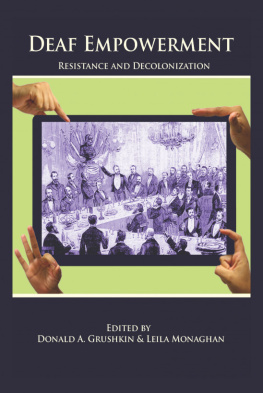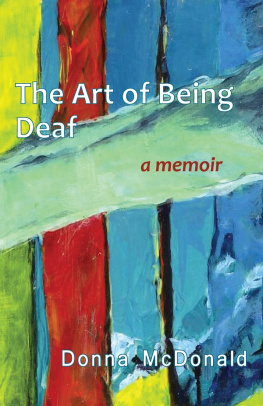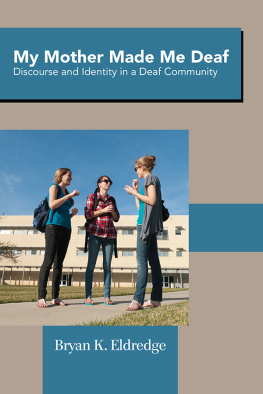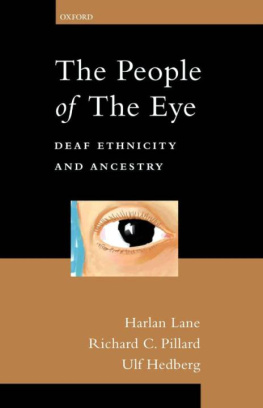Barbara Gerner Gerner de Garcia - Change and Promise: Bilingual Deaf Education and Deaf Culture in Latin America
Here you can read online Barbara Gerner Gerner de Garcia - Change and Promise: Bilingual Deaf Education and Deaf Culture in Latin America full text of the book (entire story) in english for free. Download pdf and epub, get meaning, cover and reviews about this ebook. year: 2016, publisher: Gallaudet University Press, genre: Home and family. Description of the work, (preface) as well as reviews are available. Best literature library LitArk.com created for fans of good reading and offers a wide selection of genres:
Romance novel
Science fiction
Adventure
Detective
Science
History
Home and family
Prose
Art
Politics
Computer
Non-fiction
Religion
Business
Children
Humor
Choose a favorite category and find really read worthwhile books. Enjoy immersion in the world of imagination, feel the emotions of the characters or learn something new for yourself, make an fascinating discovery.
- Book:Change and Promise: Bilingual Deaf Education and Deaf Culture in Latin America
- Author:
- Publisher:Gallaudet University Press
- Genre:
- Year:2016
- Rating:4 / 5
- Favourites:Add to favourites
- Your mark:
Change and Promise: Bilingual Deaf Education and Deaf Culture in Latin America: summary, description and annotation
We offer to read an annotation, description, summary or preface (depends on what the author of the book "Change and Promise: Bilingual Deaf Education and Deaf Culture in Latin America" wrote himself). If you haven't found the necessary information about the book — write in the comments, we will try to find it.
Within the past few decades, there has been great progress in deaf education in Latin America and growth in the empowerment of their Deaf communities. However, there is little awareness outside that region of these successes. For the first time, this book provides access, in English, to scholarly research in these areas. Written by Latin American Deaf and hearing contributors, Change and Promise provides a counter argument to external, deficit views of the Latin American Deaf community by sharing research and accounts of success in establishing and expanding bilingual deaf education, Deaf activism, Deaf culture, and wider access for deaf children and adults.
Change and Promise describes the historical, cultural, and political contexts for providing bilingual deaf education in Latin America. Bilingual deaf education uses students sign language, while simultaneously giving them access to and teaching them the majority spoken/written language. This book describes current bilingual deaf education programs in the region that have increased societys understandings of Deaf culture and sign languages. This cause, as well as others, have been championed by successful social movements including the push for official recognition of Libras, the sign language of Brazil. Change and Promise covers this expanding empowerment of Deaf communities as they fight for bilingual deaf education, sign language rights, and deaf civil rights.
Despite the vast political and cultural differences throughout Latin America, an epistemological shift has occurred regarding how Deaf people are treated and their stories narrated, from labeling deaf as handicapped to being recognized as a linguistic minority. This panoramic study of these challenges and triumphs will provide an invaluable resource for improving outcomes in deaf education and help to secure the rights of deaf children and adults in all societies.
Barbara Gerner Gerner de Garcia: author's other books
Who wrote Change and Promise: Bilingual Deaf Education and Deaf Culture in Latin America? Find out the surname, the name of the author of the book and a list of all author's works by series.

